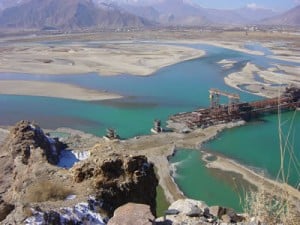
The new railway bridge being constructed across the Kyichu (Lhasa) river for the railroad linking the Ne’u (Chinese: Liuwu) township, where the station is to be built, to central Lhasa on the opposite bank of the river.
“As a Tibetan and a Quebecer, I’m ashamed that Bombardier is helping the Chinese government build the railway,” said Tenzin Dargyal, President of the Canada Tibet Committee. “I support development in Tibet, but not development that is imposed by Beijing and principally serves the interests of the Chinese Communist Party, rather than the great majority of Tibetans.”
Slated to begin test runs in 2006, the railway threatens to increase environmental pressure on Tibet’s high-altitude ecosystem, bolster China’s military strength in the region, and facilitate the entry of large numbers of Chinese settlers onto Tibetan lands, further marginalizing Tibetans socially and economically. Many Tibetans see the railway as the final phase in China’s strategy to wipe out Tibetan identity and culture.
“To Tibetans inside Tibet, the railway is a death sentence,” said Lhadon Tethong, Executive Director of Students for a Free Tibet. “The Chinese government already encourages Chinese settlers to move into Tibet in order to assimilate Tibetans and eliminate their resistance to Chinese rule. The railway will increase this population transfer exponentially, posing a dire threat to Tibetans’ survival as a people.”
“Bombardier takes no responsibility for the fact that Tibetans have not been consulted about whether they even want the railroad to be built. No matter the impact on Tibetan people or lands, they have told us there is ‘no way’ they will pull out,” said Mary Beth Markey, Executive Director of the International Campaign for Tibet. “Yet the project contradicts Bombardier’s own Code of Ethics and the International Union of Public Transport Charter on Sustainable Development, to which Bombardier claims to be a ‘full signatory’.”
The coalition, led by the Canada Tibet Committee, International Campaign for Tibet and Students for a Free Tibet, first expressed its concerns to Bombardier in October 2002. At the time, the company replied that it was “not involved” and had “taken good note of your arguments against this project”. In February of this year however, Bombardier, the world’s biggest maker of train equipment, abruptly announced its intention to build and deliver 361 railcars to China for the widely criticized project between December 2005 and May 2006.

